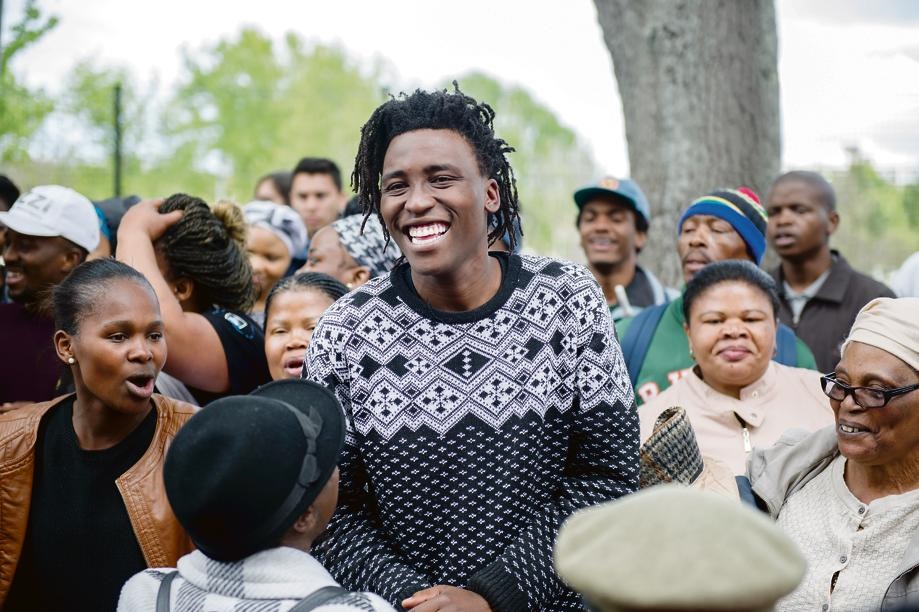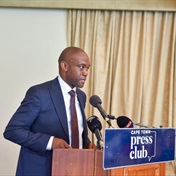
As a boy, Masixole Mlandu (24) could not have anticipated being an influential member of two of the most powerful student movements in post-1994 South Africa: #FeesMustFall and #RhodesMustFall.
Now a final-year Bachelor of Social Science (BSocSc) student at the University of Cape Town (UCT), in high school Mlandu wasn’t even sure what he wanted to study, should he make it into university.
“In all honesty, at that point I wasn’t sure what I wanted to be,” he says. “That imagination was not there in my mind.”
It was only towards the end of 2008 that things changed for Mlandu.
On one fateful afternoon, when he was standing at a street corner with his friends discussing the latest cars and fashion trends, as they had done regularly, a prominent member of the Treatment Action Campaign (TAC), Neliswa Nkwali, convinced the group to join the TAC.
The organisation had infiltrated most of Khayelitsha and continued to enjoy popular support in the township.
“I had an interest because some of my family members had been directly and indirectly affected by HIV and Aids,” he says.
“The TAC resonated with a lot of young, black people who had lost their loved ones because of this disease.”
Activism and political consciousness
Mlandu could not have imagined that the TAC would be the organisation where he would meet two of his biggest influencers: Mandla Majola and Theo Mabusela, who were responsible for “the politicisation of our minds and the thinking of South Africa as nothing but a settler, colonial state”.
It was when Mabusela – who was a member of Azanian People’s Liberation Army (the Pan Africanist Congress’ armed wing) during the apartheid era – founded the Pan Africanist Congress of Azania Site C branch that Mlandu was introduced to the “fathers of occupied Azania’s school of thought”.
He read the works of SEK Mqhayi, Es’kia Mphahlele, Robert Sobukwe and, later, Steve Biko on the black consciousness movement.
The lessons from these materials gave Mlandu the answers he had been yearning for.
“I began to find expression and to understand the deeper existential crisis of why we were in Kuyasa [Khayelitsha] and why our parents woke up early in the morning to service the life of a white person,” he says.
Early life
The last-born of three children, Mlandu was born and raised in Khayelitsha by a single, independent mother who works as a domestic worker – a job that has kept her away from her family.
Like many South Africans, Mlandu also grew up without a father; he only got to know him when he was older.
Although they have a relationship, they are not as close as Mlandu would have wanted.
“South Africa is a fatherless nation,” he says.
“If I could turn back the hands of time, I would have wished to grow up with a father, to be taught what it means to be a man [by my father and] not by society.”
Mlandu’s family is no different from many families in Khayelitsha.
It is one of many that continue to leave the rural Eastern Cape for the bright city lights of Cape Town in search of a better life.
But life in Khayelitsha is not always great.
As he extinguishes his cigarette, Mlandu is quick to point out that he has a love-hate relationship with his place of birth.
“It is a hate relationship because Khayelitsha in itself is a spatial place designed to host cheap, dispossessed, black labour.
"It is an example of our dispossession and conquest as black people and to be in such a space, in those conditions, is depressing. We are exiled from within,” says Mlandu.
But the memories he has made in Khayelitsha will always remind him that it is his only home, and home – as the saying goes – is where the heart is.
It is also where his family and siblings are.
“It’s a love relationship because of all the memories that I have and my experiences of growing up. Some of the lessons I have learnt, I have learnt in Khayelitsha.”
It was at Siphamandla Secondary School, in Khayelitsha, where he wrote his first matric examination and passed with a diploma.
Mlandu decided to rewrite some of his subjects in order to improve his results. At the same time, he graduated from the TAC and moved to Equal Education, where he became a facilitator.
It was during his time at both Equal Education and the TAC that he honed his mobilisation and public-speaking skills.
Little did he know that those very skills would become some of his greatest assets on his path through university.
Studying at UCT
Upon rewriting his matric, Mlandu was accepted to read for a BSocSc, majoring in Political Science and Sociology at UCT.
Nothing could have prepared him for what followed.
“When I got there in 2013, at UCT, it was a cultural shock. I remember calling some of my friends and saying, ‘Look, I don’t think I will make it here,’” he says.
“It was alienating, but that alienation in itself created a consciousness that we find among black people in university spaces.”
It came as no surprise when Mlandu was one of the founding members of the #RhodesMustFall movement when it was established in 2015, as well as the UCT #FeesMustFall movement later that year.
Last year, Mlandu’s activism at the university took centre stage.
He was at the forefront of campaigns for student fees to fall and to bring back fellow students whom UCT had secured an interdict against for burning university works of art and a university research vehicle in February.
Mlandu was one of the interdicted students.
In total, Mlandu was also facing an internal university disciplinary hearing and four court cases with charges ranging from intimidation and malicious damage to property to kidnapping.
He also spent a week at the notorious Pollsmoor Prison.
“I was scared, coming from Khayelitsha and being sent to Pollsmoor for demanding education is quite a hectic thing,” says Mlandu.
“My mother was worried.”
But Mlandu has no regrets. He explains that it was all a worthy sacrifice to the cause, and that being able to contribute to a cause fulfils his ambition.
“The understanding that you are black in a world of white people, or in relation to whites – all those ideas emerged prior to university,” says Mlandu.
“It has always been a dream to raise these issues at the highest level so that society could wrestle with them as much as we, as black people, wrestle with them on a daily basis.”




 Publications
Publications
 Partners
Partners






















